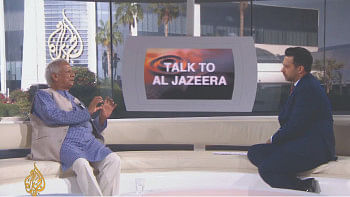Death is inevitable, but we must not get used to it

Life is but a dash
between dates, of birth and of death.
I wrote this short poem a long time ago, inspired by a cemetery headstone. I was ruminating over the plight of a man who had transformed into a corpse, then reduced to a sign marked by dates. In the eternal existence of mankind, an individual occupies a limited space. No matter how "dashing" a life may appear, it is a dash between the beginning and the end. We can think of the dash as an open-ended one, where chemical compounds mix miraculously, giving life a certain form, space, and pace, before being morphed into another, or we can think of it as a spiritual transition from one non-material form to another, passing through a physical space for a short span of time. The ups and downs of life are like the waves of an echocardiogram: it is about the adrenaline rushes, hormonal impulses, instinctive actions, and reactions that create the wave patterns, before reaching the flatline.
In Steven Spielberg's 1998 film Saving Private Ryan, war veteran Ryan takes his family to visit the grave of one Captain Miller, who had saved his life during World War II. "Tell me I've led a good life. Tell me I'm a good man," Ryan asked of his wife. He wanted his saviour to know that the sacrifices made by his peers had not been in vain. "Earn it," were the dying words of Captain Miller, whose unit was assigned to save Private Ryan as all four of his brothers had already been killed in the war. In such stories, the dash—life—gets linked with other dashes. The lines form a narrative where the group comes together to compose a story, and present life as beautiful (or ugly, for that matter). Many died so that one could live.
With more than 4.8 million people dead worldwide because of a virus, how do we "earn" the life that we have been given? How do we express our gratitude for being alive? Every day, the TV scrolls remind us of the passing away of the people who once made our lives interesting: politicians, educators, doctors, engineers, civil servants. For the unnamed rest, there is a daily tally. In any other situation, each death of the renowned figures would have occupied more TV time and media attention. Even the deaths of celebrities don't move us anymore. Have we stopped caring? If so, when did we stop caring? Why?
The rise in death figures runs in tandem with our indifference. Experts call this phenomenon "psychic numbness": the more people die, the less we care. It seems that the human brain is incapable of processing a large number of deaths. Mother Teresa once said, "If I look at the mass, I will never act. If I look at one, I will." While a single death can be construed as tragic, multiple occurrences of death may not produce the same emotions. Each death sends a shockwave of bereavement in an inner circle. At times, it can create ripples to reach many shores. Remember the three-year-old Aylan Kurdi, who was found lying face down on a sandy beach in Turkey? The photo woke up the world to the Syrian refugee crisis. Yet, the recurrent news of hundreds dying as boats capsized off the European shores fails to evoke similar empathy. Kurdi is a faded memory. The Rohingyas are the nightmares that we want to forget.
Our indifference is going to have a lasting impact in a post-Covid-19 scenario. It can damage the way we process not only human emotions, but human values. According to a BBC report, there is already evidence that people are suffering from Covid-19 news fatigue and reading less and less about the pandemic. The lack of care also shows through the reluctance to wear masks, sanitise hands, or maintain social distance. One explanation could be because humans are selfish creatures. We want to help others to feel good, but with the rise in numbers, when the situation seems overwhelmingly out of our control, our efforts to help seem as trivial as a drop in the ocean. It gives us an excuse to not care, to not help anyone anymore.
The indifference is also caused by anxieties. However, while the overwhelming presence of news of death and disease becomes a source of anxieties for some, this also becomes an opportunity to harvest the anxieties for profit by many others. We have already seen how fear-mongering techniques have been used to raise the prices of essentials, impose unnecessary medical treatments, or manipulate the online trade. The vicious circle in which news and anxiety rotate can make us further complacent. Seldom do we find any urgency to break away from this chain and to do something to change it.
There are, of course, reasons to be worried, but indifference is not an option. The agencies who are circulating the information in concrete facts and figures have an additional role to play in humanising the provided information. Both positive and negative messages are needed. If we don't show the physical, mental, social, and financial implications of a Covid-19 patient, many would take the pandemic lightly as the recovery number can cause comfort. Then again, if we overburden the mass with tragic stories, the urge to help the situation might dwindle. It is like when your school fraternity reaches out for help for one member, you feel generous, but once such requests become frequent, you are less likely to commit.
The same thing goes for the coronavirus news fatigue. Humanise it. Think of individual stories of survival. The people who made it through. The frontline supporters. Positive news needs to be presented at a processable proportion. Then again, there also needs to be constant awareness of the downside of complacency.
At a time when we are all dying, the challenge for us is to stay alive, stay human. My poem written over a headstone highlights life as a dash. But now that I have an opportunity to look back at my own poem, I think I also need to highlight all the dots, all the invisible moments that fret within the visible dash. Indeed, in the grand scheme of things, we deal with small cuts. But those pains and miseries make life worth living. It is time for us to feel good for ourselves so that we can remain good for others. Our lines must merge with the lines of others, so that we can compose a human story together.
Shamsad Mortuza is acting vice-chancellor of the University of Liberal Arts Bangladesh (ULAB), and a professor of English at Dhaka University (on leave).

 For all latest news, follow The Daily Star's Google News channel.
For all latest news, follow The Daily Star's Google News channel. 



Comments